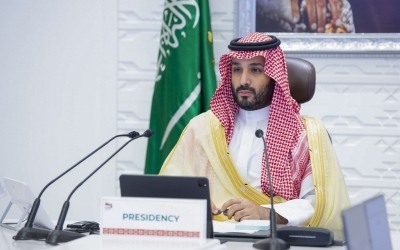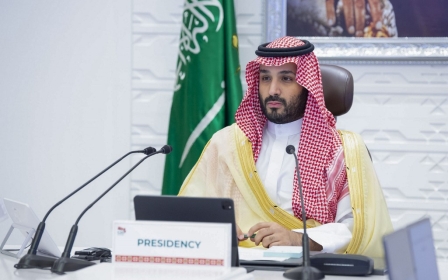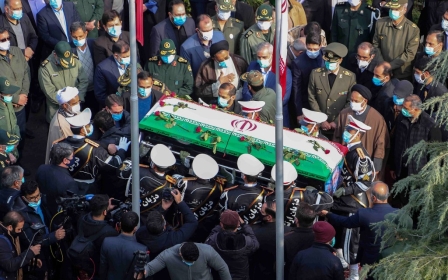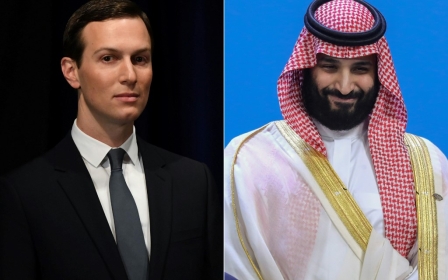Iran scientist killing: UN Security Council unlikely to act, say diplomats
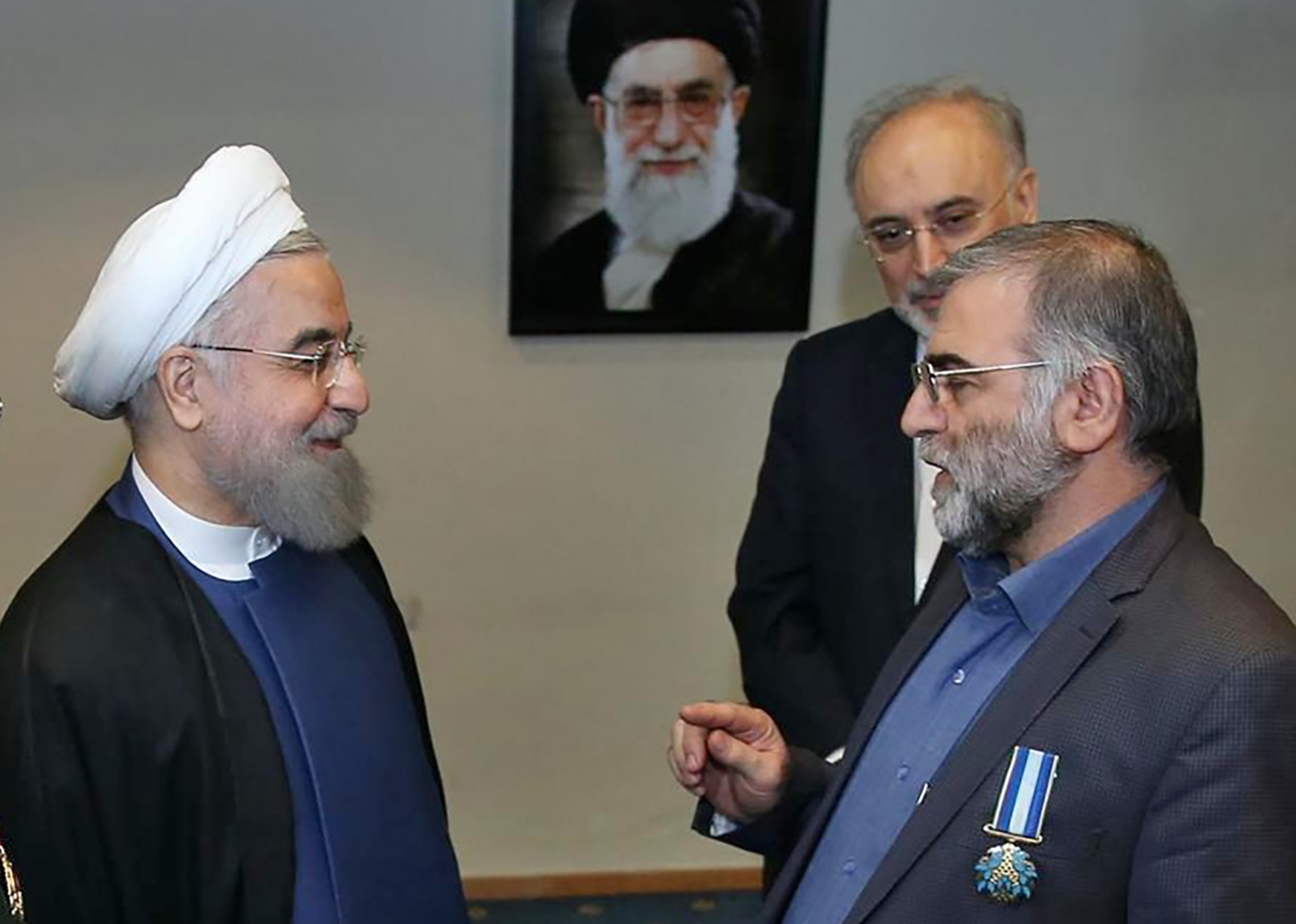
Tehran has demanded that the United Nations Security Council condemn the killing of a top Iranian nuclear scientist and take action against those responsible, but diplomats say the call is likely to go unheeded.
At a minimum, the 15-member body could discuss Friday's killing of Mohsen Fakhrizadeh behind closed doors if a member requests such a meeting, or it could agree on - by consensus - a statement on the issue.
But South Africa's UN ambassador, Jerry Matjila, council president for December, said on Tuesday that no member had so far requested to discuss the killing or Iran in general.
Diplomats also said there had been no discussion of a statement, Reuters reported.
Saudi Arabia's minister of state for foreign affairs also on Tuesday criticised Iran's foreign minister for implicating Riyadh in the killing of Fakhrizadeh.
New MEE newsletter: Jerusalem Dispatch
Sign up to get the latest insights and analysis on Israel-Palestine, alongside Turkey Unpacked and other MEE newsletters
"Iranian Foreign Minister (Mohammad Javad) Zarif is desperate to blame the kingdom for anything negative that happens in Iran. Will he blame us for the next earthquake or flood?" Adel al-Jubeir said in a tweet.
Jubeir's remarks on Iran appeared to be a response to comments made on Monday by Zarif, which suggested a covert meeting in Saudi Arabia between Crown Prince Mohammed bin Salman and Netanyahu contributed to the assassination of Fakhrizadeh.
"[US Secretary of State Mike] Pompeo's hurried trips to the region, the trilateral meeting in Saudi Arabia and Netanyahu's statements all point to this conspiracy that unfortunately emerged in Friday's cowardly terrorist act and the martyrdom of one of the country's top executives," Zarif wrote on Instagram.
Saudi sources told MEE on the day of the killing that Netanyahu has pushed for attacks against Iranian nuclear facilities during his visit to Neom on 22 November.
The crown prince was reluctant to agree, however, believing that recent attacks by Iranian proxies on oil-linked targets in Saudi Arabia were a warning that the kingdom would be targeted in the event that Iran was attacked.
'Violation of international human rights law'
The Security Council is charged with maintaining international peace and security and has the ability to authorise military action and impose sanctions.
But such measures require at least nine votes in favour and no vetoes by the United States, France, Britain, Russia or China, which all hold permanent membership of the council.
While no party has claimed responsibility for the killing of Fakhrizadeh - viewed by western powers as the architect of Iran's abandoned nuclear weapons programme - Iran has accused Israel along with Riyadh.
Israeli Prime Minister Benjamin Netanyahu's office has declined to comment.
The US traditionally shields Israel from any action at the Security Council. Washington has also declined to comment on the assassination of the scientist.
'Pompeo's hurried trips to the region, the trilateral meeting in Saudi Arabia and Netanyahu's statements all point to this conspiracy that unfortunately emerged in Friday's cowardly terrorist act'
- Iranian Foreign Minister Mohammad Javad Zarif
The UN investigator on extrajudicial executions, Agnes Callamard, said on Friday that many questions surrounded the killing of Fakhrizadeh, but noted the definition of an extraterritorial targeted killing outside of an armed conflict.
Callamard posted on Twitter that such a killing was "a violation of international human rights law prohibiting the arbitrary deprivation of life and a violation of the UN Charter prohibiting the use of force extraterritorially in times of peace".
Iran also addressed its letter on Friday to UN Secretary General Antonio Guterres.
In response, Guterres urged restraint and condemned "any assassination or extrajudicial killing", UN spokesperson Stephane Dujarric said on Saturday.
The Security Council is due to meet on 22 December for its biannual meeting on compliance with a resolution that enshrines a 2015 nuclear accord between world powers and Iran, which US President Donald Trump's administration quit in 2018.
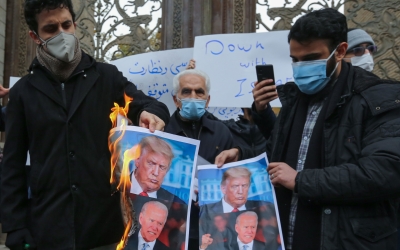
Any council member or Iran could choose to raise the killing of Fakhrizadeh during that meeting.
A senior Iranian official has said that Tehran suspects the exiled Mojahedin e-Khalq (MEK), a foreign-based opposition group, of complicity with Israel in the killing of Fakhrizadeh.
The group has rejected the accusation, Reuters reported.
Both Israel and Saudi Arabia have recently ramped up rhetoric against Iran, which is locked in several proxy wars with Riyadh in the region.
Saudi Arabia has not formally condemned the assassination, unlike the other five Gulf Cooperation Council member countries, Bahrain, Kuwait, Oman, Qatar and the United Arab Emirates.
Asked in an interview with Russian broadcaster RT on Tuesday to comment on the killing, Riyadh's United Nations envoy said the kingdom "did not support the policy of assassinations at all".
Middle East Eye delivers independent and unrivalled coverage and analysis of the Middle East, North Africa and beyond. To learn more about republishing this content and the associated fees, please fill out this form. More about MEE can be found here.


